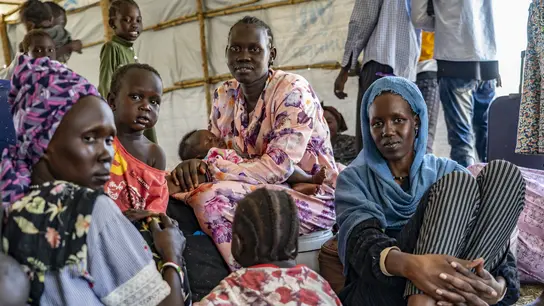Terre des Hommes for World Refugee Day on June 20th
Osnabrück/Berlin 19.06.2025 - more than 122 million people are on the run worldwide, 40 percent - more than 48 million - are children. These figures emerge from the 2024 world refugee report, which the United Nations' refugee agency (UNHCR) recently published.
The number of children who have to flee or are sold worldwide increases by more than a million compared to 2023. If you look at the past five years, the number of refugees even rose by at least 13 million. The increase falls at a time when bald strikes in the budgets of state development cooperation put a lot of pressure on refugees.
"It is a cynical catastrophe that the United States and several European countries, especially Germany, are radically cutting funding for development cooperation and humanitarian aid at a time when record numbers of people are fleeing and suffering from hunger, thirst, and a lack of medical care," said Joshua Hofert, board spokesperson for the children's rights organization Terre des Hommes . "From a humanitarian perspective, it should be unquestionable that children who have been driven from their homes should not simply be left to their fate. At the same time, assistance for refugees and displaced persons is essential to prevent vicious cycles of poverty and the emergence of ever-new sources of conflict."
The reasons for flight are mainly wars and conflicts: the largest groups of displaced people form people from Sudan, Syria, Afghanistan and Ukraine. The Sudan recorded a particularly drastic increase: more than 3.5 million people were driven out there in 2024 alone or forced to flee, more than 14 million are on the run.
Terre des Hommes is currently supporting projects for refugees from all of the countries mentioned above: for example, in South Sudan, where the partner organization Jesuit Refugee Service is providing food support to refugee families from Sudan and internally displaced persons, helping them establish their own livelihoods. The funding cuts by the United States have had noticeable consequences on the ground: Free school meals, often the most important meal of the day for refugee children, had to be discontinued in several regions. The partner organization itself had to lay off a large portion of its staff.
»In South Sudan, the emergency of refugees is particularly drastic: the food aids were not sufficient before the cuts. The recording communities are overcrowded and the adults have little chance of finding a regular job without help. The result is that many children are malnourished, cannot go to school or even have to work themselves, «says Hofert.
"This shows that the lives and futures of millions of children are at stake. Terre des Hommes therefore calls on the German government and members of the Bundestag to continue providing life-saving resources instead of reducing humanitarian efforts as announced. Where other partners fail, it is all the more crucial that we step in wherever possible and remain firmly by the children's side."
